
The Fundação Nacional dos Povos Indígenas or FUNAI is a Brazilian governmental protection agency for Amerindian interests and their culture.
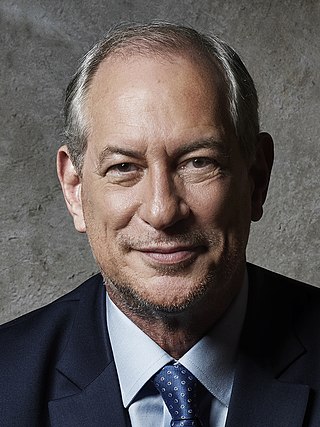
Ciro Ferreira Gomes, known mononymously as Ciro, is a Brazilian politician, lawyer, and academic. Ciro is currently affiliated with and vice-president of the Democratic Labour Party (PDT).
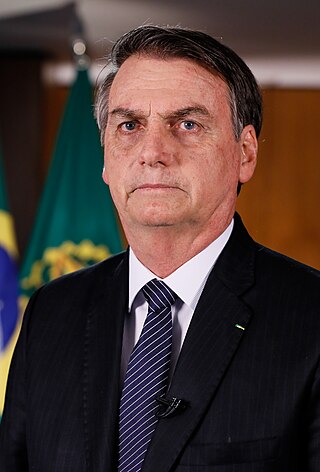
Jair Messias Bolsonaro is a Brazilian politician and retired military officer who served as the 38th president of Brazil from 2019 to 2022. He previously served as member of Brazil's Chamber of Deputies from 1991 to 2018.

Simone Nassar Tebet is a Brazilian academic, lawyer, and politician who has served as the Brazilian Minister of Planning and Budget since 5 January 2023. She previously was Senator for Mato Grosso do Sul from 2015 to 2023, Vice-Governor of Mato Grosso do Sul from 2011 to 2014, and mayor of Três Lagoas from 2005 to 2010. A member of the Brazilian Democratic Movement (MDB), of which she was the leader in the Senate from 2018 to 2019, Tebet was the MDB candidate for president in the 2022 Brazilian general election, placing third with 4.16% of the vote. After endorsing Luiz Inácio Lula da Silva, in the second round, Tebet was appointed Minister of Planning.

Sônia Bone de Souza Silva Santos, usually known as Sônia Guajajara, is a Brazilian indigenous activist, environmentalist, and politician. A member of the Socialism and Liberty Party (PSOL), she was initially a candidate for President of Brazil in the 2018 Brazilian general election, before being chosen as the vice presidential running mate of nominee Guilherme Boulos. This made her the first indigenous person to run for a federal executive position in Brazil. In 2022, Guajajara was named one of the 100 most influential people in the world by Time.

Antônio Hamilton Martins Mourão is a Brazilian politician and retired military officer who served as the 25th vice president of Brazil from 2019 to 2022.

Romeu Zema Neto is a Brazilian businessman, administrator, and politician affiliated with the NOVO party. The current Governor of the state of Minas Gerais, Zema served as the head of the Zema Group, an industrial conglomerate, from 1990 to 2016. First elected in 2018, he won 42.73% of the valid votes, qualifying for a second round against Antônio Anastasia. Winning with 72.80% of the votes, he was inaugurated in 2019.

Carlos Nantes Bolsonaro, is a Brazilian politician, the second son of the 38th President of Brazil, Jair Bolsonaro.
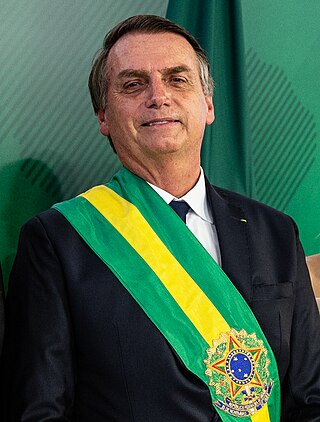
The presidency of Jair Bolsonaro started on January 1, 2019, when he was inaugurated as the 38th president of Brazil, and ended on December 31, 2022, with the inauguration of the cabinet of Lula da Silva III on January 1, 2023. He was elected the president of Brazil on October 28, 2018, by obtaining 55.1% of the valid votes in the 2018 Brazilian general election, defeating Fernando Haddad. On October 30, 2022, Bolsonaro was defeated by Lula da Silva. In the years Brazil has been a democracy since 1985, Bolsonaro became the first president to lose an election as an incumbent.
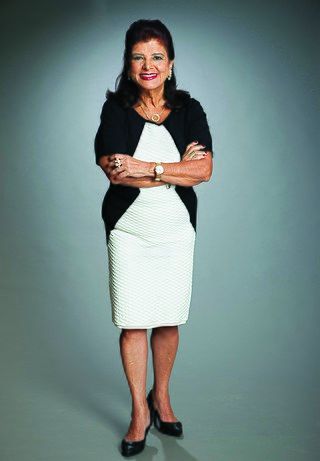
Luiza Helena Trajano Inácio Rodrigues is a Brazilian billionaire businessperson. She is chair of the retailer Magazine Luiza and associated companies. In July 2020, Forbes noted that she was Brazil's wealthiest woman. Trajano is an advisory board member to both UNICEF Brazil and UNFPA Brazil, among other entities. In 2021 Luiza was listed by TIME magazine as one of the 100 most influential people in the world. She is a feminist. As of April 2022, her net worth was estimated at US$1.4 billion.
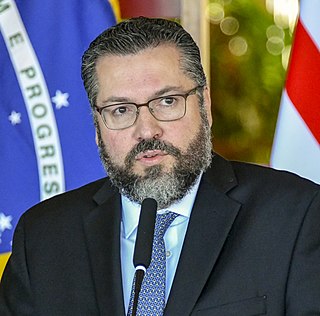
Ernesto Henrique Fraga Araújo is a Brazilian diplomat and Brazil's former Minister of Foreign Affairs. Chosen by Brazil's president Jair Bolsonaro in January 2019 following a suggestion made by Olavo de Carvalho, Araújo subscribes to theories such as man-made climate change is untrue and a "communist plot", "globalism" is a process driven by "cultural Marxism", and the COVID-19 pandemic is the result of another communist plot he dubbed "comunavirus".

Célia Nunes Correa, better known as Célia Xakriabá, is an indigenous educator and activist of the Xakriabá people of Brazil. She is best known for holding debates and lectures at universities in Brazil promoting, among other things, advancement of the status and rights of indigenous women, indigenous land rights, and indigenous education.

Since the 2018 Brazilian general election, polling companies have published surveys tracking voting intention for the next election. The results of these surveys are listed below in reverse chronological order and include candidates who frequently polled above 3%.

The 2021 Brazilian protests were popular demonstrations that took place in different regions of Brazil in the context of the COVID-19 pandemic. Protests both supporting and opposing the government happened.

Alessandra Korap is an indigenous leader and Brazilian environmental activist from the Munduruku ethnic group. Her main work is defending the demarcation of indigenous territory and denouncing the illegal exploitation and activities of the mining and logging industries. Alessandra is internationally recognized for her work. In 2020, she received the Robert F. Kennedy Human Rights Award in the United States. In 2023, Korap was awarded the Goldman Environmental Prize for South and Central America.

The 2022–2023 Brazilian election protests began shortly after the conclusion of the 2022 Brazilian general election's second round on October 30, in which Luiz Inácio Lula da Silva was elected president, which led to mass protests and roadblocks nationwide. Supporters of Jair Bolsonaro, who are frequently referred to in media accounts as Bolsonaristas, alleging election fraud, began blocking roads and highways in the country. At least 23 Brazilian states, plus the Federal District, recorded roadblocks as of 1 November, adding up to at least 267 roadblocks according to data from Federal Highway Police (PRF).
During the presidency of Jair Bolsonaro (2019–2023), a series of mass deaths, famine, forced displacements and other major human rights violations took place in the Brazilian Yanomami Indigenous Territory. Such events reportedly started or were aggravated from 2019 on as a consequence of rampant exploitation of natural resources by individuals and companies with state approval, and have been frequently said to constitute a genocide against the Yanomami people.
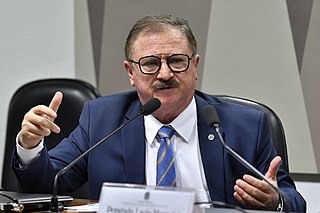
Nabhan Garcia is a Brazilian politician and farmer, who was the Secretary of Land Affairs in the government of President Jair Bolsonaro, in addition to being appointed as president of the Rural Democratic Union. A member of the Brazilian branch of the Nabhan family, he is the son of Sofia Nabhan Garcia and Rafael Garcia Martins.
The Trincheira/Bacajá Indigenous Territory is an indigenous territory located in the Brazilian state of Pará. Regularized and traditionally occupied, it has an area of 1,650,939 hectares and a population of 746 people (2010), primarily from the Araweté and Asurini peoples of the Xingu.
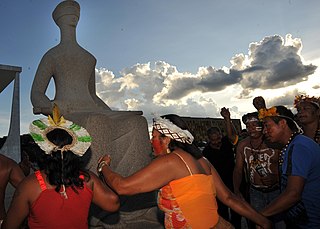
The milestone thesis, also known as the time marker or Copacabana thesis, is a legal thesis constructed by a case law based on the judgment of the Raposa Serra do Sol case by the Supreme Federal Court (STF) of Brazil in 2009. In it, the Supreme Court decided that the article of the Constitution which guarantees the usufruct of lands traditionally occupied by Brazilian indigenous people should be interpreted by counting only the lands in possession on 5 October 1988, the date of promulgation of the Constitution.


















